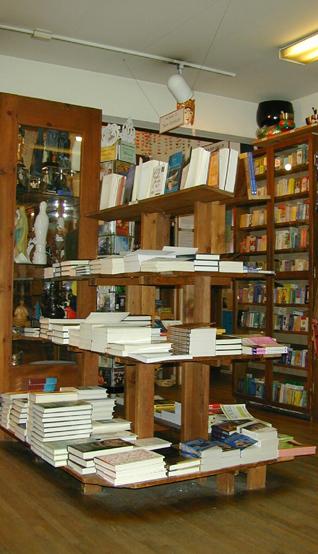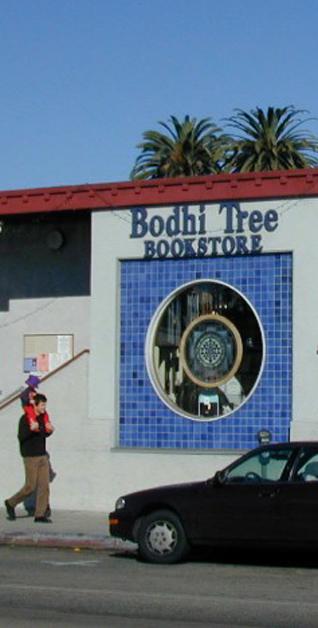Books & Bookshops: Bringing a Horse to Water, or Vice Versa
by I.J. SINGH
The Big Apple - New York City’s Manhattan - now has a brand new gurdwara. I think it is the first such community space for Sikhs in the city. My regret is that, having spent almost four decades in it, it happened after I moved out of the city.
Just two blocks from it stands a musty old building, with its best days behind it, with the modest logo: J. Levine Co. 1890, Judaica.
I entered and a whole new world opened.
Two decades ago, the New York Times (November 25, 1991) noted: “J. Levine & Company is not the typical old-fashioned religious bookstore. The showroom has marbled floors, polished chrome and glass cases with blue neon trim. On display are hand-painted mezuzahs, Batman and Ninja Turtle yarmulkes, and gold and silver menorahs.”
It’s a place where they still love books. Arts Judaica for all your Jewish needs. Danny Levine, the fourth generation scion of the family now manages this richly embellished labor of love that claims to house the world’s largest collection of Judaic books and paraphernalia.
"I've found that people are looking today for presentation or atmosphere," said the owner. “His sales,” he said, “had doubled over the last three years and went up 10 percent in one year.” The store also carries religious articles and furniture for synagogues and schools and operates a successful mail-order service. Apparently, diversification has made the store recession-proof.
The store is chock full of books on a variety of topics from the Jewish perspective. Themes range from serious theology, cook books, gay and lesbian Jews, to intermarriage in Soviet Jewry, humor and photography.
A new book on or about Judaism or Jewish life is published every two or three weeks.
The many “Christian Book & Gift” shops that dot the landscape of this country and continent are the Christian counterparts to J. Levine, the Jewish place for the Jewish arts.
Walk into a Christian book store; the kindness and smiles of the staff overwhelm you. Piped-in music greets you and soothes your soul; the aura instantaneously awakens your senses and transports you into a different universe with pleasant aromas that waft in and around you.
What better way to welcome a visitor?
There are books and religious gift-items galore. Everything is tastefully displayed and arranged such that even wandering through and “window shopping” becomes both pleasant as well as instructive. The plethora of medallions and artifacts can become preachy but one can find books on the variety of human experience and issues that confront us in life - from drug addiction, psychosocial and sexual issues to bioethical concerns or the history and interpretation of Christian questions like the import of Crucifixion. The staff is always most helpful and knowledgeable.
Such ruminations took me to a different reality that I briefly experienced not so long ago.
Amidst a brutal winter, I was in India at a conference for a week. At my request the sponsors arranged my stay in the YMCA - right in the shadow of the historic Bangla Sahib gurdwara in Delhi. I wanted the proximity of the gurdwara to be refreshing, energizing and available.
What caught me was the stark contrast in energy, attitude and worldview exemplified by the two adjoining centers - the Christian YMCA and the Sikh Gurdwara Bangla Sahib.
Half a dozen YMCA or YWCA buildings abut the entrance to Bangla Sahib. Every Christian edifice displayed huge, larger-than-life billboards that you couldn’t miss if you tried. They advertised services - from the religious, with cake and bake sales (this was the "X-mas" season), to books and lessons in sewing for women, ESL (English as Second Language) classes, tutorials in mathematics and science, driving lessons and classes in tennis, golf, swimming and self-defense; even computer skills could be learned for a nominal sum. Signs touted a safe, modestly-priced residence for single working-women, irrespective of religion, caught in the din and hyper-madness of the big city.
And the books ranged from poetry to cooking and, of course, Christianity; they were not just modestly priced but cheap, like 3 or 4 for a hundred Rupees - about two for a dollar.
Who wouldn’t be attracted? To get customers a business has to first catch and hold the eye; religion is no different. And then you work on building loyalty and repeat business.
In contrast, Bangla Sahib had a special strongbox on display and a larger than life sign to solicit donations for gold plating of the building. True, that this may have been there only for a few weeks or so. There were billboards nearby within the gurdwara premises - for prayer services at various deras or other gurdwaras for warding off evil spirits and bad omens.
There were a few private business stalls just outside the gurdwara perimeter hawking CD’s of hymns, breviaries (gutkas), patkas, kirpans , karras and other paraphernalia of a Sikh life. The space was small and crowded, the merchandise not attractively displayed but piled on top of each other - only the sales staff could handle it; they alone knew where to find something. One had to know exactly what to want and ask for; there was no room to sit or browse.
User friendly these stalls are not.
Bangla Sahib has no bookshop in or near it but another massive historical gurdwara nearby -
Rakabganj - does. So I trekked out to that. It’s also the headquarters of the Delhi Gurdwara Management Committee - an eye-catching, expensively constructed monument fashioned largely in marble.
No signs directed me to the bookshop which is in the basement and reached via a wide swirling marble staircase. I don’t know the amount of space allocated to the book shop in square feet but it is beyond impressive.
Books were stacked in one huge hall in several spacious aisles. But the lighting was so dim that reading seemed both difficult and unwelcome. Books were in cloth-wrapped bundles with a couple of copies from each bundle sitting atop of each package. I failed to detect any order to their display - by author, title or topic. One would be lucky to find something one is looking for.
In summary, the bookshop is housed in a poorly lit basement, with no cataloging. Pick a book and stroll around and you just won’t remember where to put it back or pick another.
Only one man seemed to know where any and every book could be found, and that is a credit to his phenomenal memory and dedication. But pity the visitor if he saw a book somewhere and now wanted to revisit that area again.
On content I would rate the shop near a ten on a scale from one to ten, but in being user-friendly I would be falling off the chart on the other end.
I wish this bookshop was in a busy public space where Sikhs and non-Sikhs travel about and, more importantly, if it could become user friendly in presentation and organization.
There is no functioning lending library in Bangla Sahib, Rakabganj or any other gurdwara anywhere that I know of.
Parenthetically, I have to add that both these historic gurdwaras do have a functioning and busy medical clinic. I also heard of a multi-million dollar plan for a huge state of the art medical facility near Rakabganj.
North America boasts of over 200 gurdwaras but I have yet to see one with a functioning library or a book shop. Yes, many gurdwaras have a collection of books that remain uncatalogued and behind closed doors inaccessible to everyone except for an hour or two on Sundays. In time, most books slowly but surely disappear. And I wonder who selects the books; there appears to be little thinking directing their acquisition.
I am aware of only one that I would dub half-way decent book shop for Sikh literature and artifacts in North America and that is the Sachha Sauda near the airport in Toronto - not attached physically to any gurdwara.
Once again, because it has many books and other paraphernalia - the contents get an A but not always the presentation. In user friendliness it pales. One has to cover one’s head to walk in and remove one’s shoes, even though it is a bookshop and not a gurdwara.
It can and does attract people off the street as any shop should - mostly Sikhs but a fair number of non-Sikhs, too. Its organization and lay-out does not encourage the casual and the curious to walk in and just thumb through what is available.
Sachha Sauda, our one-of-a-kind book shop in North America, like J. Levine, has a healthy mail order business as well.
Mind you, and I want to emphasize this, with Sachha Sauda we have come a long way forward. It’s just that we have a longer way to go. My brief negative notations about it here are not meant to disparage or diminish it but to propel it further forward.
Keep in mind that just about every town in North America has a Christian bookstore. Also, don’t forget that every two-bit town in this country has a secular book shop and practically all of them have a section on religion where Christian and Jewish literature is easily found.
One can also find a book or two on Hinduism and Islam, with a growing collection on Buddhism, but it is as if Sikhism doesn’t exist.
The story of most public libraries is similar.
Considering that in my house, books seem to grow like crab grass I should have heeded the dubious axiom that “books, like friends, should be few and well chosen.” But I never have. Ergo, I thirst for the Minerva Book Shop in Simla, India, that whetted my appetite for books over 60 years ago, and sometimes I think longingly of the musty smells of the Strand in New York City that boasts of eight miles of books.
My mind went to a pithy and brief comment by Danny Levine, the manager of the 121 years-old J. Levine Company with which I started this column today: "I want the store to be the Henri Bendel of Judaica," he said. "People should feel, wow, this is Judaism at its best."
What a wonderful idea!
Exactly as I envision how Sachha Sauda and the Rakabganj Book Shop might be transformed with a bit of imagination and a modicum of effort - and soon. And then may they clone rapidly all over the world.
Forget not that words come in books and that Sikhi is a way of life for which the Word is the eternal living Guru.
ijsingh99@gmail.com
October 3, 2011
Conversation about this article
1: Harinder (Uttar Pradesh, India), October 03, 2011, 11:26 AM.
Sikhs need to produce great prolific writers who will have deep impact on the world industry of Epistemology - the study of the nature and grounds of knowledge.
2: Jaswinder Singh (Brier, WA, U.S.A.), October 03, 2011, 12:41 PM.
I.J. Singh ji: Can you recommend some books in English for gurdwaras to keep around, that can give fairly reasonable insight into Sikhism to non-Sikhs and our youth?
3: Baldev Singh (Bradford, United Kingdom), October 03, 2011, 12:48 PM.
It may be too late! The world's religions and their xenophobic followers have used up so much of the earth's resources for looting, pillaging, killing or converting vulnerable humans to their perverse ideologies based on Stone Age reasoning, that the Sikhs can only hang their heads in shame for not at least explaining an alternative way to live our lives. Our Gurus expect us to do more. Good books and bookstores are much needed.
4: V. Singh (U.S.A.), October 03, 2011, 3:18 PM.
Great writers are bred in an environment of free thought and exploration within. Truth can be expressed in stories, but must be unconfined by the limits of dogma. Perhaps a community that fails to create writers with universal impact, should search within and analyze if it it wastes precious energy on useless arguments of identity and politics, rather then nurturing the self exploration needed for creating great thinkers.
5: N. Singh (Canada), October 03, 2011, 6:07 PM.
V. Singh ji: I find your argument unfair and lacking a historical perspective. Ever since the inception of the Khalsa in 1699 and upto the present day, Sikhs have been involved in a constant struggle for their survival. Whether it was persecution during the Mughal Raj or the ethnic cleansing in present day India; across the world and over the ages we have been in constant flux, trying to establish ourselves. This has left little time for self-exploration or introspection. Identity and politics are burning issues in our community and until we have these resolved, at least in our own minds, little can be achieved. What can we tell the world if we don't even know who we are and what we stand for? Because in the past we have not taken the time and energy to focus on these issues we have as a matter of convenience and habit adopted the practices of the majority around us. That in itself has now created a new set of problems ... female foeticide, dowry deaths, casteism and superstition. We have not taken the time even to define our own customs and have taken on those of others, e.g., Raakhi. A portion of our population is uneducated and lacks basic critical thinking skills. What have we done to help them, other than turn away and disassociate ourselves from them? There is no unity or leadership amongst us. All these issues are tied to identity and politics. I am not saying that we do not need writers, philosophers and bookstores, all I am saying is that the cause is greater than the symptoms you point out.
6: I.J. Singh (New York, U.S.A.), October 03, 2011, 8:59 PM.
V. Singh and N. Singh: Wouldn't you say that identity is at the very core of human existence? The questions that haunt us: who we are, what we are, and why we are the way we are, are, in the final analysis, never-ending quests. And that is indeed self-exploration. It is from these and related questions that both our achievements and failures take life, and that means our doubts, prejudices, limitations and even wars. Also, from the same sources arise our nobility, love and play; community and nation building, character, laughter, literature including poetry; also including matters both sacred and profane. These are all products of self-exploration and our sense of self - our identity. This one cannot deny. But one can rue where we are at a given time and in which direction we are heading. The issues of identity are basic to all sentient people - just look at the Jews, Hindus, Muslims, the variety of Christians, and so on and on. The question then becomes the nature of the ongoing national conversation in a society and the procedures that define the dialog. Books - the written word - have a seminal place in any human interchange and exploration.
7: Harinder (Uttar Pradesh, India), October 04, 2011, 9:51 AM.
We must all concentrate on translatng all the human Knowledge into Punjabi. At the same time, we must continue creating new ideas. Each learned Sikh should have at least one book to his credit, either written originally or translated. Let them teach in Punjabi schools, whereever they exist, to have subjects on how to write books. To me, all of it can be learned; you don't have to be a born writer.
8: V. Singh (U.S.A.), October 04, 2011, 10:24 AM.
I.J. Singh ji: we all have our own perceptions and interpretations, and no two people can ever see eye to eye. What really matters is our reaction to things, irrespective of our own understanding. There can never be unanimity of thought. To advance, people must be accustomed to not react with narrow mindedness or anger to things they do not like or disagree with. We can rue about the lack of good books, but have to also accept that maybe it's our reactions that contribute to the lack of creativity in this sphere. Whether a writer writes the "Satanic Verses" or the a "Behzti" play, the maturity of a community can be ascertained from the nature of how it behaves in response to it. Violent and intolerant behaviour often pushes individuals from associating with those communities and they search for avenues far away from them. The spirit of respectful debate, even on difficult topics, is very difficult to find in most communities which focus more on religion rather then spiritual evolution.
9: Kirpal Singh (New Zealand), October 04, 2011, 3:22 PM.
The libraries in Bangla Sahib and Rakab Ganj are nothing more than Middle School level libraries in Delhi. The book shop at Rakab Ganj Sahib is lacking the texture of a good book shop. I wrote a letter to the President of D.S.G.M.C., drawing his attention to the deplorable state of gurdwara libraries and book shops. The reply was that this area was not on their priority list. Recently I saw in their expansion plan of Gurdwara Rakab Ganj, a modern library is going to be added. Sikhs in general do not buy books or have a library at home. I lived in Punjabi Bagh, Delhi for some time and visited several acquaintaces to see their collection of books but was shocked to see that even highly educated families do not have a book-shelf in their homes. Having said that, on the contrary, my house is full of books from works of philosophers to books on various religions and faiths. After many years of study of diverse books by various authors and on different shades of thoughts, I have now a small shelf next to my bed stacked with some gutkas and a separate room with prakash of Guru Granth Sahib ... which remains always in prakash round the year, except on the day we clean the room; I know most Sikhs will detest this practice but I find that it serves my purpose to consult the Guru Granth at any time without going through any lengthy ritual, etc). I have given away most of my collection of books to some universities (in India and abroad) and college libraries. My current resolve is centered on the following: My greatest purchase was a nitnem gutka (costing less than Rs. 10/-) at a young age, which has counted more than anything else in my life. I wish every Sikh boy and girl to have a nitnem gutka of their own. An investment in Guru Granth Sahib and gurbani books is safe, and sure to bring plenty of dividends. Daily reading and contemplating on a part of the Guru Granth Sahib amounts to attending the best university offering a collection of good and divine courses. Reading/ studying writings of gursikhs and other enlightened persons (including those of other religions and beliefs) for which they have labored so hard amounts to inviting extra blessings.
10: N. Singh (Canada), October 04, 2011, 10:03 PM.
V. Singh ji: I agree and understand your later comments. However, here are my own observations. I would describe myself as an educated, independent woman who grew up and has lived most of her life in the West. I like to pride myself on my sense of justice, fairness and critical thinking skills. Although I am not overly religious, since I am still discovering and deciphering Sikhi, I have a strong sense of affiliation with our community and history. There are not many that I like or many that I am great friends with but my attachment to the community, as a group, runs very deep. Perhaps deep down inside, I know that I owe my psychological makeup to Sikhi through my parents. Perhaps there are shared DNA and traits, who knows? Interestingly enough when anyone criticizes Sikhs or questions Sikhi I find that, despite myself, I get a strong sense of anxiety and emotion. I react like a jealous and angry housewife who feels that another woman will steal her husband. Perhaps there is a deep sense of insecurity that someone will steal 'Sikhi' or Sikh history from me, or that it will be sullied, perhaps it's a shared muscle memory from hundreds of years of persecution that someone is attacking something that I value. I don't really understand it myself. It is not an intellectual but an emotional, visceral reaction. I have learned over the years to externally control this reaction, but I still feel it. This has made me more tolerant of others when they react, although I am not condoning violence or any attack on freedom of speech. Perhaps it's just a matter of maturity and the need to understand that no matter what, no one can take what truly belongs to us, and that Sikhi will survive despite everything and everyone else.
11: Jodh Singh (Jericho, New York, U.S.A.), October 05, 2011, 2:12 PM.
I appreciate the criticism of bookshops, libraries and even paucity of good books. The reason is that Sikhs do not like to read books and that comes from our education methodology. During schooling, book reading was not advised. Teachers used to dictate notes and one would cram them up and pass the examination. Same was true of writing skills. First time I read a book was in nEw York. And how to write has been another learning experience. If we not read books or journals, why should there be book-stores or libraries? It is wrong to criticise book-sellers or gurdwaras. Some enthusiastic Sikh put some books in a public library and nobody took them out for two years; the librarian then took pulled them off and placed them in storage.
12: Baldev Singh (Bradford, United Kingdom), October 05, 2011, 6:52 PM.
Ultimately, we are the real People of the Book. We as Sikhs get on our knees and bow to the most important and extraordinary 'book'.
13: I.J. Singh (New York, U.S.A.), October 06, 2011, 9:00 AM.
Jodh Singh ji: I understand the dilemma that faces us; it is a bit like the chicken-and-egg. To foster interest in reading, we need to be engaging with the written word in the Guru Granth as well as books in homes, libraries, and shops with a makeover of how kids are taught in schools. To get bookshops and libraries, we need a people that already love the world of words and books. So what comes first - the love of books or the libraries and shops that have them. Perhaps we need to start on both simultaneously because one feeds the other. Nevertheless, not an easy matter to resolve.
14: Gurpal (West Midlands, United Kingdom), October 06, 2011, 3:30 PM.
Kirpal ji: I totally agree, every Sikh child should have access to an inexpensive yet high-quality gutka with English translation. My father, a first generation sehajdhari, bought me one in the year 1980 for the sum of £1 ("Three prayers of the Sikh World" by Joginder Singh Kang). It was my first introduction to Sikhism and was one of those books you glanced at when bored or just handled randomly before going to bed. Slowly, slowly, you begin to take more and more interest. Then the interest grows and grows. A fund should be established by Sikhs in every country for free distribution of finely-produced gutkas. There is no shortage of money and the cost would be low ... if mass produced, it can easily be less than a pound, even a dollar, per gutka of top-notch quality, not the S.G.P.C. variety. It could build a whole new generation of Sikhs!
15: Harwinder Singh (London, United Kingdom), February 24, 2014, 9:25 AM.
I am looking for a copy of the following gutka: "Three prayers of the Sikh World", by Joginder Singh Kang.






